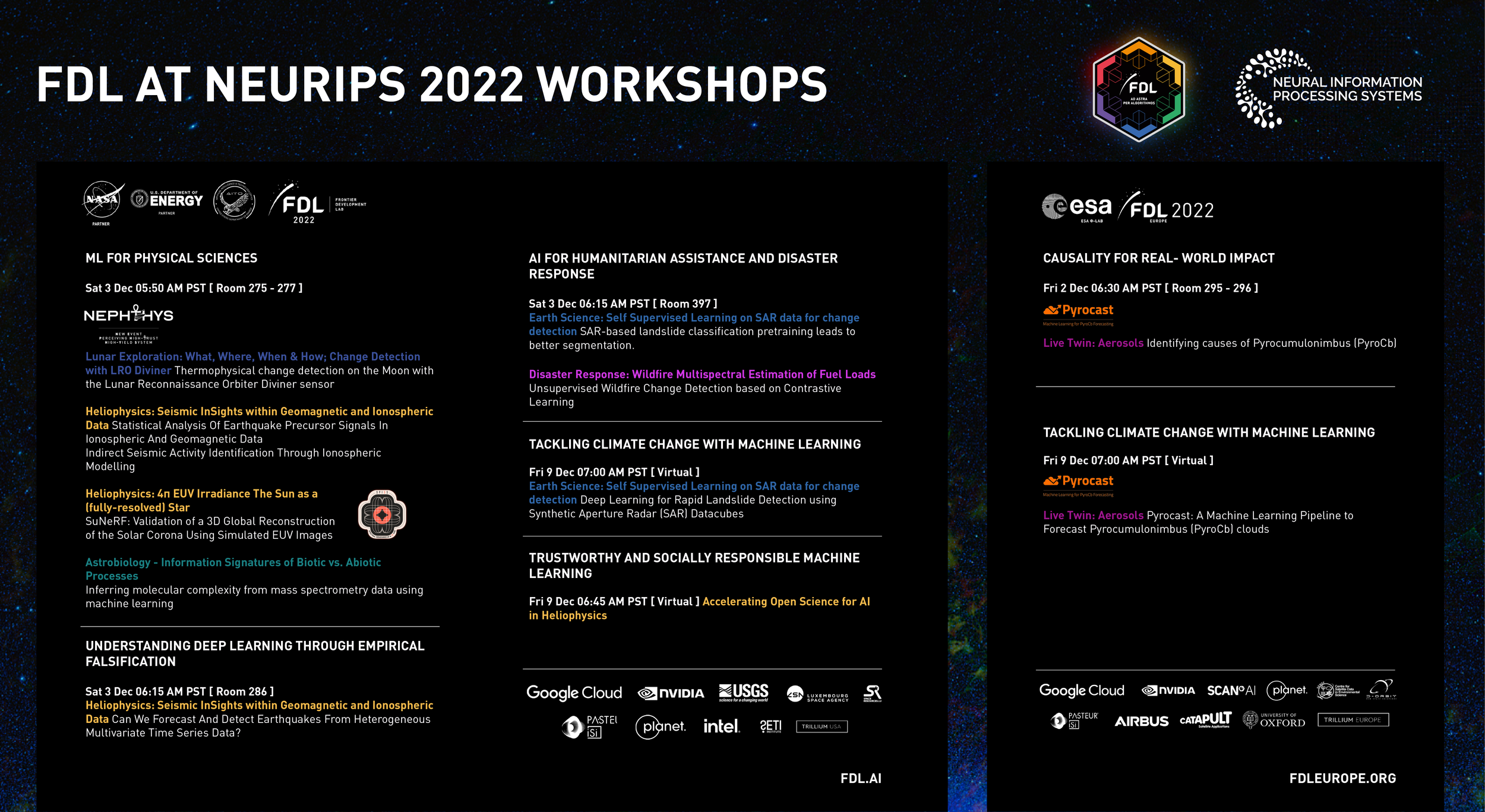
FDL Workshops @NeurIPS 2022
CAUSALITY FOR REAL-WORLD IMPACT
Fri 2 Dec 06:30 AM PST [ Room 295 - 296 ]
Live Twin: Aerosols
Emiliano Diaz, Kenza Tazi, Ashwin Braude, Daniel Okoh
Nis Meinert, Kara Diane Lamb, Paula Harder, Duncan Watson-Parris, Alexander Lavin
Identifying causes of Pyrocumulonimbus (PyroCb)
ML FOR PHYSICAL SCIENCES
Sat 3 Dec 05:50 AM PST [ Room 275 - 277 ]
Lunar Exploration: What, Where, When & How; Change Detection with LRO Diviner
Ben Gaffinet, Silvia Bucci, Elizabeth Ramirez, Ziyi Liang
Ben Moseley, José Ignacio Delgado Centeno, Brad Neuberg, Siddha Ganju, Miguel A. Olivares-Mendez, Valentin Bickel, Corbin Kling
Thermophysical change detection on the Moon with the Lunar Reconnaissance Orbiter Diviner sensor
Heliophysics: Seismic InSights within Geomagnetic and Ionospheric Data
Andy Smith, Asadullah Hill Galib, Debvrat Varshney, Luke Cullen
Filip Svoboda, Peter Chi, Edward Brown, Xiangning Chu
Statistical Analysis Of Earthquake Precursor Signals In Ionospheric And Geomagnetic Data
Indirect Seismic Activity Identification Through Ionospheric Modelling
Heliophysics: 4π EUV Irradiance The Sun as a (fully-resolved) Star
Benoit Tremblay, Margarita-Kyriaki Bintsi, Miraflor Santos, Robert Jarolim
Andres Munoz-Jaramillo, James Mason, Anna Jungbluth, Angelos Vourlidas, Sairam Sundaresan
SuNeRF: Validation of a 3D Global Reconstruction of the Solar Corona Using Simulated EUV Images -
Astrobiology - Information Signatures of Biotic vs. Abiotic Processes
Aaron Bell, Jaden Hastings, Jian Gong, Timothy Gebhard
Burcin Bozkaya, Kimberley Warren-Rhodes, Nathalie Cabrol, Atılım Güneş Baydin
Inferring molecular complexity from mass spectrometry data using machine learning
Digital Twin: Environmental Remediation
Aurelien Meray, Ilijana Mastilovic, Lijing Wang, Takuya Kurihana
Haruko Wainwright, Satyarth Praveen, Zexuan Xu, Alexander Lavin
Multi-scale Digital Twin: Developing a fast and physics-infused surrogate model for groundwater contamination with uncertain climate models
UNDERSTANDING DEEP LEARNING THROUGH EMPIRICAL FALSIFICATION
Sat 3 Dec 06:15 AM PST [ Room 286 ]
Heliophysics: Seismic InSights within Geomagnetic and Ionospheric Data
Andy Smith, Asadullah Hill Galib, Debvrat Varshney, Luke Cullen
Filip Svoboda, Peter Chi, Edward Brown, Xiangning Chu
Can We Forecast And Detect Earthquakes From Heterogeneous Multivariate Time Series Data?
AI FOR HUMANITARIAN ASSISTANCE AND DISASTER RESPONSE
Sat 3 Dec 06:15 AM PST [ Room 397 ]
Earth Science: Self Supervised Learning on SAR data for change detection
Ioannis Prapas, Ragini Bal Mahesh, Vanessa Böhm, Wei Ji Leong
Edoardo Nemni, Freddie Kalaitzis, Brad Neuberg, Raul Ramos-Pollan, Siddha Ganju, Julie Nutini
SAR-based landslide classification pretraining leads to better segmentation.
Disaster Response: Wildfire Multispectral Estimation of Fuel Loads
Amani Al Abri, Huiqi Wang, Karol Bot Gonçalves, Beichen Zhang
Cormac Purcell, Dale Hamilton, Ash Hoover, Carter Katzenberger, Cole McCall, Vít Růžička
Unsupervised Wildfire Change Detection based on Contrastive Learning
TACKLING CLIMATE CHANGE WITH MACHINE LEARNING
Fri 9 Dec 07:00 AM PST [ Virtual ]
Earth Science: Self Supervised Learning on SAR data for change detection
Ioannis Prapas, Ragini Bal Mahesh, Vanessa Böhm, Wei Ji Leong
Edoardo Nemni, Freddie Kalaitzis, Brad Neuberg, Raul Ramos-Pollan, Siddha Ganju, Julie Nutini
Deep Learning for Rapid Landslide Detection using Synthetic Aperture Radar (SAR) Datacubes
Live Twin: Aerosols
Emiliano Diaz, Kenza Tazi, Ashwin Braude, Daniel Okoh
Nis Meinert, Kara Diane Lamb, Paula Harder, Duncan Watson-Parris, Alexander Lavin
Pyrocast: A Machine Learning Pipeline to Forecast Pyrocumulonimbus (PyroCb) clouds
TRUSTWORTHY AND SOCIALLY RESPONSIBLE MACHINE LEARNING
Fri 9 Dec, 6:45 aM PST [ Virtual ]
Accelerating Open Science for AI in Heliophysics
Dolores Garcia, Paul Wright, Mark Cheung, Meng Jin, James Parr
Space & ml social: AI generated images
NeurIPS 2022 Space & ML Social Event
Our NeurIPS 2022 Space & ML social kicked off with a social experience for attendees to meet each other and foster co-opetition (cooperative competition) in a space & ML quiz (with winners&prizes!), with special guests from our federal and space industry partners. We then hosted a relaxed catered networking session with our FDL researchers, mentors and partners.
HERESY OR OPPORTUNITY: CAN AI MAKE US, MORE CREATIVE?
Creativity is invariably seen as the opposite of computation. A precious, undefinable, ephemeral and most human of traits.
At FDL we’ve been watching AI become more and more useful as a creative tool. This is isn’t something we’ve deliberately tried to build, but seems to be happening anyway - for example:
Using tuned-language models to synthesize large bodies of content into insight and glean useful digestible nuggets.
Using image-synthesis tools like DALL E to visualize and create surprising outcomes.
Building knowledge graphs and seeing potentially useful collisions and combinations.
Optimizing solutions by understanding the causal interactions.
At this year’s NeurIPS social, we’d like to explore the possibility that AI is making humanity more creative. And is this a heresy or opportunity?
Ad Astra,
the FDL Team
Schedule
18.00 Arrival
18.10 Welcome from FDL
18.15 Space & ML quiz co-opetition session
18:35 FDL Special guests!
19:05 Creative challenge (with refreshments)
19:35 Review and reveal (with winners and prizes)
19:40 Networking
Location: New Orleans Ernest N. Morial Convention Center (Room 391)

















